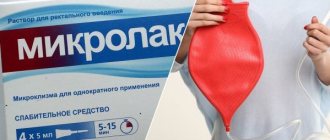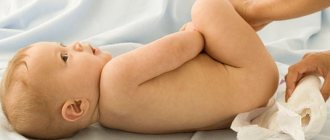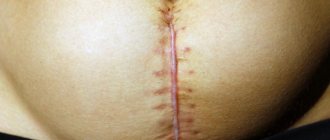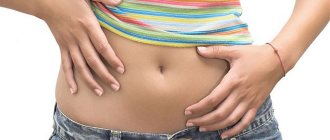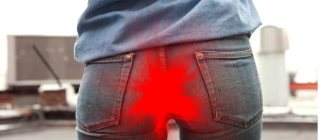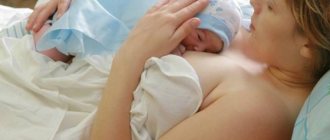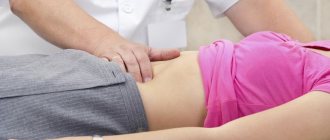Often a young woman, awaiting the birth of her first child, stoically withstands all sorts of problems in her body associated with pregnancy: heartburn, constipation, nausea, swelling, etc. Two thoughts help her with this. The first is to give birth to a healthy child. And the second is that after giving birth, all this disgrace will stop, as if by magic, and she, a happy mother, will become strong, healthy and beautiful again. But now the birth is over, but some of the “unpleasant extra weight” remains, and some have been added. Among these “somethings” is constipation, which can make life difficult after having a baby.
Constipation is difficult or systematically incomplete bowel movement (defecation) or its absence for a day and a half or more. Constipation in the postpartum period is usually associated with several reasons:
- A sharp change in hormonal levels.
- Weakening and stretching of the abdominal and perineal muscles.
- Uterine pressure. In the early postpartum period, the uterus is still enlarged and to some extent continues to put pressure on the intestines. (Immediately after birth, the weight of the uterus is about a kilogram, and it returns to normal, “non-pregnant” sizes only after 6-8 weeks).
- A change in the position of the intestines in the abdominal cavity, its gradual displacement to its usual place.
- Violation of peristalsis (motor activity of the intestine, due to which food masses move).
- Fear of straining due to stitches (placed in case of cesarean section, episiotomy, ruptures) and hemorrhoids.
- Irrational diet for a nursing mother.
- Psychological stress associated with caring for a child and a new family status.
- Congenital features of the intestine, for example, elongated sections.
Advertising
What causes constipation after childbirth?
Constipation, scientifically speaking, is systematic problems with bowel movements, or a complete absence of stool for one and a half days or more. The reasons why they occur:
- Changes in hormonal levels;
- Weakening of the muscle tone of the perineum and abdominal muscles;
- The weight of the uterus (after childbirth in the first 6-8 weeks it does not decrease in weight, which causes pressure on the intestines);
- Anatomical changes in the position of the intestine, returning it to a normal, but still unusual place;
- Psychological problems (fear after a cesarean section that the stitches will come apart, fear of hemorrhoids);
- Lack of time for yourself (yes, with the arrival of the baby it seems that you cannot leave him for a minute, but as a result it turns out that the mother develops a psychological ban on even a banal trip to the toilet);
- Physiological feature, most often congenital;
- Incorrectly selected diet for a nursing mother.
As you can see, there are quite a few reasons. It is not at all easy to establish the exact one. But let's talk a little about the positive aspects: you have time to read! Moreover, if suddenly you don’t have a book or phone at hand, then an air freshener, new toilet paper, packaging for personal hygiene products turn out to be no less entertaining reading. And yet, what to do if you suffer from constipation?
Why does constipation occur?
Based on the mechanism of occurrence, two types of defecation disorders can be distinguished.
The first type is atonic , in which the tone of the muscular wall of the intestine decreases, peristalsis becomes sluggish and unproductive. Atonic constipation often occurs due to muscle weakness after cesarean section. This is a common intestinal reaction to any surgical intervention in the abdominal cavity. It can also occur due to dietary mistakes.
Another form is spastic constipation, when intestinal tone is increased and peristalsis becomes unproductive due to the “tight” state of the intestine. Psychological reasons are more typical for this type.
Atonic constipation may be accompanied by nagging, aching pain in the abdomen, a feeling of intestinal fullness, increased gas formation, lack of appetite, nausea, lethargy, apathy, and depressed mood. When defecation occurs, there is a lot of feces, the initial portion is formed, dense, larger in diameter than normal, the final portion is runny. Defecation is painful, there may be tears in the mucous membrane of the rectum and anus, then streaks of blood and (or) mucus remain on the surface of the stool.
In the spastic form, the pain is paroxysmal, most often in the left side of the abdomen. There may be flatulence, lack of appetite, fatigue, nervousness, irritability, nausea, feces in the form of so-called “sheep feces” - very dense stools in small round portions. The urge to defecate may even occur several times a day, but bowel movements are incomplete, difficult, and in small portions.
Separately, it should be said about constipation associated with lengthening of the large intestine. Although outwardly they appear as a spastic form, such constipation is not associated with contraction of the intestines, but with a longer passage of feces along a longer path. At the same time, more water is absorbed back into the body from the intestinal contents, and the stool becomes hard. Such constipation is treated not as spastic, but rather as atonic, but more on that later.
Folk remedies to combat constipation
Girls, I’ll be honest: remedies for constipation from our grandmothers and mothers only help those who initially have weak intestines, and also do not have medical problems. But they are perfect for those who have psychological difficulties, as help with an unhealthy diet, etc.
Initially, you should review your diet and add muesli, buckwheat, millet and pearl barley, oat bran, black bread, vegetable oils, vegetables and fruits (carrots, beets, pumpkin, zucchini, spinach, lettuce, broccoli, cabbage, melon, apples, apricots, cherries).
And your best friend is fermented milk products! Banal kefir quite often has a magical effect, and delicious yoghurts also lift your spirits.
Naturally, it is better to give preference to low-fat ones.
And don’t turn up your beautiful nose!) Even from these ingredients, very soon you will learn to prepare many delicious dishes that you will not be able to part with even after breastfeeding ends. An undoubted advantage will be not only a happy intestine, but also a slowly disappearing tummy.
For example, I was highly advised to eat boiled beets. But it had no effect on me at all! Although, for the sake of entertainment, I smeared it on her cheeks, as grandmothers used to do, which made my husband and child laugh incredibly. This was the most impressive reaction to her))
But the compote turned out to be more effective against constipation . I share the recipe:
- 1 cup dried apricots
- 1 cup prunes
- 2 tsp raisins
- 2 g rhubarb, powdered
You drink all this at night, and in the morning you fly like a bullet to the toilet! But at the same time, carefully monitor the child’s condition (whether he has a rash, whether he has started going to the toilet too often, or whether there are other reactions).
A simple method helped my friend a lot: drink 1 tsp every morning on an empty stomach. vegetable oil.
The procedure, let’s say, was also not pleasant, however, after a month everything returned to normal. The second one was helped by microenemas.
I did not agree to this experiment. And, as it turned out later, she did the right thing, otherwise she could have developed intestinal dysbiosis!
IMPORTANT: any laxatives become addictive over time! That is, your body either stops responding to them, or is completely unable to carry out its tasks independently. Be extremely careful not to overdo the experiments!
Causes of problems with bowel movements
To effectively eliminate constipation that occurs during the postpartum period, it is first necessary to establish its nature.
Experts identify two groups of reasons that can contribute to problems in this area: physiological and psychological.
Physiological reasons
Pregnancy and childbirth are serious processes that involve the occurrence of many changes in the female body:
- stretching of the muscles of the perineum, peritoneum,
- intestinal displacement,
- disturbance of hormonal balance, peristalsis.
All this can cause constipation.
If the muscles are in a weakened state, atonic constipation often occurs.
A woman may feel discomfort, pain, nausea, and apathy. In this case, mucus and blood discharge may be present in the stool.
Psychological reasons
The reasons for this nature are hidden in the fear of seams coming apart.
Gynecologists advise women who have received stitches after childbirth to observe certain restrictions.
It is especially recommended that you avoid physical activity during the first couple of months after childbirth.
Also, you should not push until complete healing. In addition to this, the situation may be complicated by new worries, thoughts, and worries.
Psychological reasons lead to spastic type constipation.
In this case, the stool looks like spherical lumps. Symptoms include lack of appetite, abdominal cramps, and nausea.
Medication for constipation
Breastfeeding mothers not only have a very limited diet, but also medications must be selected taking into account the circumstances.
The pharmacy will offer you a fairly large number of all kinds of drugs, but I would still recommend trying folk remedies and physical exercises first, but I will tell you about them later.
It is worth noting that most drugs include senna leaves, an excellent laxative. But they can negatively affect the lactation process and also cause intestinal problems in the baby.
By the way, the vaunted horse chestnut can even lead to the cessation of lactation. Therefore, it is better to abandon these in favor of more expensive but gentle medications. To get started, try regular glycerin suppositories . They are even given to children, so they won’t cause any harm.
MICROLAX , which works for 15 minutes, also helps a lot True, it cannot be used constantly. Rather, this is an emergency drug:
When medical help is needed
Quite often, patients are embarrassed by such problems, so due to the delicacy of the pathology, they do not rush to seek qualified help. Many people try to cope with the problem on their own. If rectal suppositories do not help cope with constipation, then you should urgently contact a specialist. The help of a doctor is especially required if there is unbearable pain in the peritoneum, bowel movements occur once every 2 days or less, and blood is released from the anus or blood clots appear in the stool. Sometimes constipation indicates serious problems such as adhesions, tumor formation or intestinal obstruction.
But diarrhea after cesarean section should not be ignored either. Some mothers, fearing constipation, rely on coarse fibrous foods, which soften the stool. But sometimes such a manifestation can warn of the development of an infection, which can easily penetrate the body, weakened by long gestation, anesthesia and surgical childbirth.
Therefore, any problems with stool, if they last long and are persistent, should be a reason to contact a specialist. If measures are taken in a timely manner, within a couple of days there will be no trace left of the problem.
Exercise for constipation
You can help yourself at home with simple physical exercises. Check with your doctor first to see if you can start moving slowly.
In principle, if the birth was natural and without deep tears, then such simple exercises can be started the very next day. Here are a few simple and accessible ones for those who have just given birth:
- Lying on your back, slightly bend your knees. Inhale deeply and exhale forcefully. At the same time, a woman’s stomach should work as hard as possible both during inhalation and exhalation. You are allowed to start doing the exercise the next day after giving birth.
- Lie the same way, squeezing your knees. Tighten your pelvic muscles, hold your breath, exhale, relax. Can be done from the third day after birth.
- Lying on your back, raise your right leg and left arm at the same time, hold your breath. Lower, exhale, relax, do the same with opposite parts of the body.
- Standing, clasp your fingers together. We inhaled, turned and stretched back as far as possible, returned to the starting position, and exhaled.
- Lie down, bend your knees, raise your pelvis, hold your breath. Lower your pelvis and exhale.
Of course, there are many more exercises that can help relieve constipation after childbirth. The main thing is don’t overdo it!
Features of treatment
Constipation after childbirth (occurring naturally or by cesarean section - it doesn’t matter) is complicated by the fact that not every medication is acceptable during breastfeeding (breastfeeding). Treatment for a nursing mother should be extremely gentle, gentle and safe for the baby. To help a woman get rid of constipation during breastfeeding, it is allowed to use exclusively natural drugs with a local spectrum of action (for example, glycerin suppositories).
Constipation in a nursing mother should be treated exclusively by a qualified specialist who can develop an adequate therapeutic course that is both effective for the patient and safe for her baby. In addition, effective treatment is impossible without the young mother following a certain diet and the necessary physical activity. Procedures such as enema and abdominal massage have a good effect.
First aid
What to do if a woman has certain difficulties with bowel movements after giving birth? Of course, severe postpartum constipation should be treated by an experienced doctor. However, you can help a nursing mother by alleviating her condition by using simple methods that will be quite effective and safe even during breastfeeding. A cleansing enema will be very effective for constipation after childbirth. You can use both regular cleansing enemas with the introduction of a large amount of water into the rectal area, and medicinal enemas.
If you have hemorrhoids and difficulty defecating, an oil enema can help. To prepare it, you need to heat 0.5 liters of water and add 100 milliliters of olive oil. The enema tip is gradually inserted into the anal area, lying on your side. Before bowel movement, it is advisable to lie quietly for about 20-30 minutes so that the medicine has the desired effect.
Abdominal massage, which must be done in a clockwise circular motion for 10-15 minutes, can also help eliminate defecation problems that arise after childbirth. You can help a woman who has problems with bowel movements during breastfeeding using traditional medicine recipes, which, due to their natural composition, will not cause any harm to the health of the newborn.
For example, a remedy such as dill seed infusion will be very effective for constipation. To prepare the medicine, you need to pour 1 tablespoon of dill seeds into a glass of boiling water and leave for an hour to infuse, then drink a few sips (3-4 times a day). Beet juice also has laxative properties. Therefore, a nursing mother suffering from constipation is recommended to drink a glass of warm water 2 times a day, in which 1 teaspoon of beet juice has been diluted.
Another effective cure for constipation during breastfeeding is a mixture of kefir and vegetable oil. It is recommended to mix these ingredients in equal quantities (1 tablespoon each) and drink before going to bed.
Medication approach
Any medications during breastfeeding should be prescribed exclusively by the attending physician. If severe constipation occurs after childbirth, only properly selected drug treatment can help a nursing mother. Typically, in such cases, women are prescribed rectal suppositories. Suppositories for constipation after childbirth have a high-quality local effect directly in the rectal area and have a minimal range of contraindications and side effects. Glycerin and sea buckthorn suppositories are especially popular among young mothers.
Glycerin suppositories help soften stool and facilitate the process of defecation. In addition, glycerin and sea buckthorn suppositories do not contain chemicals, and therefore are absolutely harmless even for a newborn baby. However, glycerin suppositories are contraindicated for hemorrhoids, when they have worsened, and in the presence of anal fissures.
But what to do if suppositories do not help cope with difficult bowel movements? Severe constipation in a nursing mother requires treatment with medications. During breastfeeding, the patient can be helped by using the following laxatives:
- Duphalac.
- Lactulose.
- Phytomucil.
- Normaze.
- Forlax.
Such drugs do not pass into breast milk and have a mild effect, and therefore treatment with them is quite acceptable during breastfeeding. The dosage and duration of the therapeutic course for constipation after childbirth is determined by the attending physician on an individual basis.
Diet therapy
Constipation during breastfeeding often occurs due to poor diet and drinking disorders. Therefore, an effective fight against this disease after childbirth requires the woman to follow a certain diet. A young mother's daily diet must include fresh vegetables and fruits rich in plant fiber.
Products such as kiwi, figs, bran, cereals, sunflower oil, oatmeal, kefir, and cottage cheese also have a laxative effect. But you should refrain from eating fried foods, rice, fatty meats, smoked meats and baked goods, or at least reduce their presence in the diet to a minimum. Proper drinking regime will also help to cope with the occurrence of postpartum constipation. According to experts, a nursing mother needs to drink at least 2 liters of fluid daily, and at least half of the daily intake should consist of ordinary clean water.
You should start the day with a glass of water, and before going to bed, drink a portion of low-fat kefir. Very useful drinks for a woman during lactation are dried fruit compotes, herbal infusions, mint tea, and gooseberry infusion. But you will have to temporarily give up whole fat milk, coffee, strong tea and soda.
A separate topic - hemorrhoids
Hemorrhoids, and even during breastfeeding? What could be worse? Of the products tested by my friends, I can recommend the Platinus Gemo solution. It will not only become an excellent assistant in the fight against this nuisance, but will also promote the healing of cracks, relieve inflammation, pain, and many other unpleasant symptoms.
But, of course, you decide for yourself how to help yourself. If you or your baby also has bloody stools, do not delay your visit to the doctor!
Be healthy, share your knowledge with your friends on social networks and subscribe to blog updates. There is still a lot of useful information ahead.
Author: Ivanova Victoria
Prevention of intestinal ailments after surgery
Among the ways to prevent constipation, physical activity, your diet and water regime are of great importance. They are the basis for the prevention of constipation.
Read more about menstruation after cesarean section while breastfeeding.
Basic measures to prevent constipation.
- Eat foods high in fiber. This includes: whole grain cereals and breads, brown rice, beans, fresh fruits and vegetables.
- Drink plenty of water, about 6-8 glasses a day. The liquid can soften stools by being absorbed into the fiber consumed.
- When you feel the urge to defecate, do not tolerate it - this can lead to constipation.
- Move more , this helps relieve spasm of the intestinal muscles.
- Constipation and hemorrhoids often go hand in hand . Treating hemorrhoids reduces the risk of constipation.
In some cases, although not often, constipation is a symptom of a more serious problem. If it does not go away or you experience any additional sensations, contact your doctor or midwife immediately.
An active lifestyle and healthy eating on a regular basis will help you stay healthy and free from intestinal problems. Preventing the problem is the best way to deal with any disorder.
Avoid enemas unless necessary
Mechanical bowel cleansing methods, such as enemas and special chamomile and herbal enemas popular in some communities, can cause serious harm to natural bowel movements.
What is required from others
- Understanding, sympathy, any help and support. If you need to sit next to a woman who has taken a laxative on the toilet for half an hour and hold her hand - sit, hold, try to look tenderly. This is important for women.
- The softest hygiene products, diapers for adults, pads.
- Solutions of furatsilin, glorogexidine, potassium permanganate.
- A huge supply of Vaseline and baby oils.
- Willingness to immediately bring a bowl of warm water and a large towel at any time.



